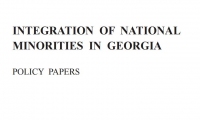Integration of National Minorities in Georgia
Integration of National Minorities in Georgia
Author(s): Author Not Specified
Subject(s): Inter-Ethnic Relations, Ethnic Minorities Studies
Published by: CSS - Center for Social Sciences
Summary/Abstract: National minorities make up a substantial portion of the entire population of Georgia. However, the level of their participation in social and political life is limited. From the legal perspective, the Georgian legislation and the European Framework Convention for the Protection of National Minorities ensure the equality of opportunities for national minorities. Nevertheless, the quality of minority participation in political decision-making still remains a great challenge. // This policy paper provides recommendations for the political parties and the Government of Georgia on how to increase the level of political participation of national minorities through the electoral system; pointing to the need for the establishment of regional offices of political parties; and recommending the government to offer additional incentives to political parties to promote the national minority participation. // Book has been published by the Netherlands Institute for Multiparty Democracy and by OSCE High Commissioner on National Minorities,
- E-ISBN-13: 978-9941-0-9921-2
- Page Count: 138
- Publication Year: 2017
- Language: English
Electoral Systems and National Minorities
Electoral Systems and National Minorities
(Electoral Systems and National Minorities)
- Author(s):Kristine Margvelashvili, Ana Tsiklauri
- Language:English
- Subject(s):Constitutional Law, Human Rights and Humanitarian Law, Inter-Ethnic Relations
- Page Range:9-39
- No. of Pages:31
- Keywords:electoral systems; Georgia; national minorities;
- Summary/Abstract:National minorities make up a substantial portion of the entire population of Georgia. However, the level of their participation in social and political life is limited. From the legal perspective, the Georgian legislation and the European Framework Convention for the Protection of National Minorities ensure the equality of opportunities for national minorities. Nevertheless, the quality of minority participation in political decision-making still remains a great challenge. The current mixed electoral system fails to ensure the full-fledged political participation of national minorities. They are underrepresented in the legislature which causes and is also caused by the low level of political participation of national minorities.
Political Participation of National Minority Women in Georgia
Political Participation of National Minority Women in Georgia
(Political Participation of National Minority Women in Georgia)
- Author(s):Levan Kakhishvili
- Language:English
- Subject(s):Gender Studies, Civil Society, Ethnic Minorities Studies, Sociology of Politics
- Page Range:41-70
- No. of Pages:30
- Keywords:national minorities; Georgia;
- Summary/Abstract:The goal of this paper is to analyse the degree of political participation of women belonging to national minorities in Georgia, to identify the factors hindering their higher level of involvement in politics and to develop recommendations for various stakeholders interested in increasing the role of minority women in Georgian politics. Based on focus group discussions with participants from Samtskhe-Javakheti and Kvemo Kartli regions as well as in-depth interviews with representatives of political parties and experts in the field of minority issues, this paper concludes that minority women’s involvement in politics is extremely limited and that there are two types of impeding factors. First, structural factors include the type of electoral system, recruitment practices within the political parties, and knowledge of the state language. Second, cultural factors include perceptions of and fear of politics among minority women, and gender prejudice and stereotypes within the minority communities and generally in Georgian society.
Social and Economic Standing of National Minorities in Georgia
Social and Economic Standing of National Minorities in Georgia
(Social and Economic Standing of National Minorities in Georgia)
- Author(s):Diana Bogishvili, Irine Osepashvili
- Language:English
- Subject(s):Ethnic Minorities Studies, Human Resources in Economy
- Page Range:71-104
- No. of Pages:34
- Keywords:national minorities; Georgia;
- Summary/Abstract:According to Article 31 of the Constitution of Georgia, the state shall ensure the equal socio-economic development of the country’s whole territory. Article 2.3 of the Labour Code of Georgia prohibits any kind of discrimination in labour relations based on race, skin colour, language or ethnic and national affiliation. Discrimination is qualified as a direct or indirect oppression of a person with the goal of creating a hostile, degrading or humiliating environment or else creating conditions that would make the standing of the person inferior to that of other persons in similar conditions (Article 2.4), with the exception of cases when inequality of treatment is conditioned by the essence of the performed duty and is serving the lawful goal (Article 2.5). According to the OSCE High Commissioner on National Minorities Ljubljana Guidelines for successful societal integration, it is essential that all members of the society equally participate in social and economic life. OSCE member states shall provide every individual, regardless of their ethnic origin, with the means to enjoy equal opportunities to participate and contribute to the economy and benefit from the resources and shared wealth of the country.
Access to Information for National Minorities in Georgia
Access to Information for National Minorities in Georgia
(Access to Information for National Minorities in Georgia)
- Author(s):Diana Bogishvili, Ana Tsiklauri
- Language:English
- Subject(s):Civil Society, Inter-Ethnic Relations, Ethnic Minorities Studies
- Page Range:105-134
- No. of Pages:60
- Keywords:Georgia; national minorities;
- Summary/Abstract:To ensure safeguarding the rights of national minorities, and their integration in the society, a new State Strategy for Civic Equality and Integration and 2015-2020 Action Plan was developed under the Office of the State Minister for Reconciliation and Civic Equality of Georgia, in 2015. One of the intermediate objectives of this Strategy is improved access to media and information for national minorities. A more detailed overview of this intermediate goal is provided in sub-chapter 2.2 of the State Strategy for Civic Equality and Integration and 2015-2020 Action Plan. Based on the problems mentioned in the introductioon, the goal of the present policy paper was set – to study the current situation regarding the access to information in national minority populated regions of Georgia, and identify difficulties related to access to information.

